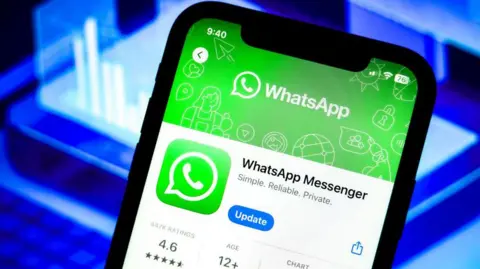 Getty Photos
Getty PhotosWhatsApp has informed the BBC it’s supporting Apple in its authorized battle in opposition to the UK House Workplace over person information privateness.
The messaging app’s boss, Will Cathcart, stated the case “may set a harmful precedent” by “emboldening different nations” to hunt to interrupt encryption, which is how tech corporations hold their customers’ information non-public.
Apple went to the courts after receiving a discover from the House Workplace earlier this 12 months demanding the appropriate to entry the information of its world prospects if required within the pursuits of nationwide safety.
It and different critics of the federal government’s place say the request compromises the privateness of tens of millions of customers.
The BBC has approached the House Workplace for remark.
It has beforehand declined to remark instantly on the Apple case.
But it surely has informed the BBC the federal government’s “first precedence” is “to maintain individuals secure” and the UK has a “longstanding place of defending our residents from the very worst crimes, comparable to little one intercourse abuse and terrorism, similtaneously defending individuals’s privateness.”
Awkward row
WhatsApp has utilized to submit proof to the courtroom which is listening to Apple’s bid to have the House Workplace request overturned.
Mr Cathcart stated: “WhatsApp would problem any legislation or authorities request that seeks to weaken the encryption of our providers and can proceed to face up for individuals’s proper to a non-public dialog on-line.”
This intervention from the Meta-owned platform represents a serious escalation in what was an already extraordinarily high-profile and awkward dispute between the UK and the US.
Apple’s row with the UK authorities erupted in February, when it emerged ministers had been searching for the appropriate to have the ability to entry data secured by its Superior Knowledge Safety (ADP) system.
The argument intensified within the weeks that adopted, with Apple first pulling ADP within the UK, after which taking legal action in opposition to the House Workplace.
It additionally sparked outrage amongst US politicians, with some saying it was a “harmful assault on US cybersecurity” and urging the US authorities to rethink its intelligence-sharing preparations with the UK if the discover was not withdrawn.
Tulsi Gabbard, the director of US Nationwide Intelligence, described it as an “egregious violation” of US residents’ privateness.
Civil liberties teams additionally attacked the UK authorities, saying what it was demanding had privateness and safety implications for individuals around the globe.
Privateness versus nationwide safety
Apple’s ADP applies end-to-encryption (E2EE) to recordsdata comparable to images and notes saved on the iCloud, which means solely the person has the “key” required to view them.
The identical expertise protects various messaging providers, together with WhatsApp.
That makes them very safe however poses an issue for legislation enforcement businesses.
They will ask to see information with decrease ranges of safety – if they’ve a courtroom warrant – however tech corporations at present haven’t any approach to supply entry to E2EE recordsdata, as a result of no such mechanism at present exists.
Tech firms have historically resisted creating such a mechanism not simply because they are saying it might compromise customers’ privateness however as a result of there could be no approach of stopping it will definitely being exploited by criminals.
In 2023, WhatsApp stated it might rather be blocked as a service than weaken E2EE.
When Apple pulled ADP within the UK it stated it didn’t need to create a “backdoor” that “dangerous actors” may benefit from.
Additional complicating the argument across the House Workplace’s request is that it’s made underneath the Investigatory Powers Act, the provisions of which are sometimes secret.
When the matter got here to courtroom, authorities legal professionals argued that the case shouldn’t be made in public in any approach for nationwide safety causes.
Nonetheless, in April, a judge agreed with various information organisations, together with the BBC, and stated sure particulars ought to be made public.
“It might have been a very extraordinary step to conduct a listening to fully in secret with none public revelation of the truth that a listening to was going down,” his ruling said.
On the time, the federal government declined to touch upon the proceedings however stated: “The UK has strong safeguards and impartial oversight to guard privateness and privateness is simply impacted on an distinctive foundation, in relation to probably the most critical crimes and solely when it’s vital and proportionate to take action.”


